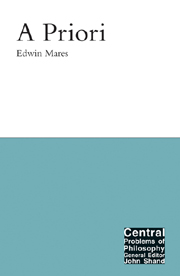1 - Introduction
from Part I
Summary
What is a priori knowledge?
Consider the statement “Every coloured thing is extended in space”. This seems obviously true. If we think about some things that have no length or breadth or depth, we see that they have no colours. Examples of such things are individual points in space and, at least according to traditional philosophy, thoughts. A point cannot have any colour and neither can a thought (although, of course, we can think about colours). But surveying such objects seems unnecessary. We do not have to check everything that has a colour to discover whether it is extended in space. It seems that we can just know this by thinking about it. Traditionally, philosophers have said that this is something that we can know a priori, that is, we can know it independently of experience. Thus, some philosophers say that we can know a priori that every coloured thing is extended. Our knowledge in this case is supposedly independent of experience.
Let us look at another example. Think of a geometrical figure with three straight sides. Let it also be closed: do not allow any gaps in it. How many angles does this figure have? You know the answer: it has three angles. You do not need to check real three-sided figures to make sure they have three angles. From a consideration of the nature of three-sided figures alone, you can know that they all have three angles. This is a priori reasoning.
- Type
- Chapter
- Information
- A Priori , pp. 1 - 12Publisher: Acumen PublishingPrint publication year: 2011



